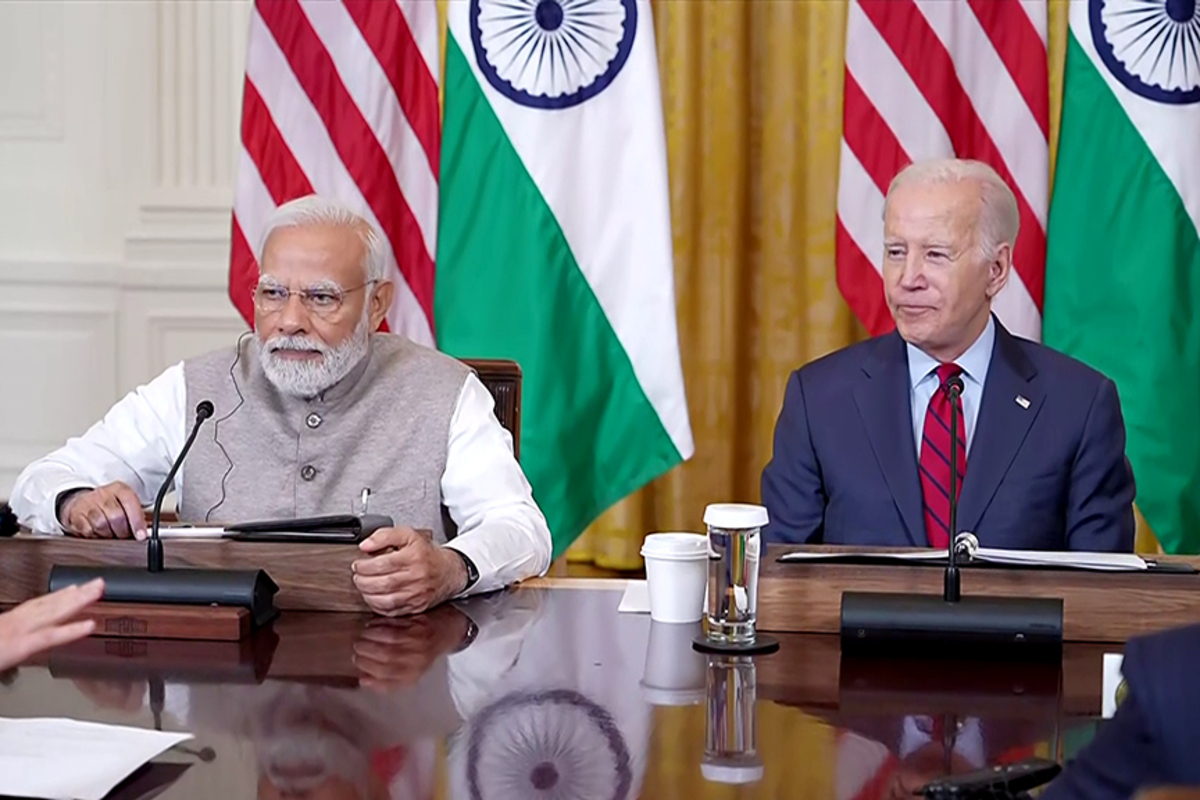BJP for action against NC MP’s statement on tourism
BJP chief spokesman Sunil Sethi on Tuesday slammed National Conference (NC) MP Aga Ruhullah Mehdi for allegedly making a controversial statement that tourism causes cultural invasion in Kashmir.
The statement was released during the one-on-one meeting between Prime Minister Modi and US President Joe Biden at the Oval Office in the White House, on Thursday.

Prime Minister Narendra Modi and United States President Joe Biden (ANI Photo)
The US-India joint statement released during Prime Minister Narendra Modi’s maiden State visit to the country, left open the option of asking the Financial Action Task Force (FATF) to further tighten its anti-money-laundering and terrorism financing standards, Dawn reported.
The joint statement also urged Pakistan to take ‘immediate action’ against all terrorist groups. The statement was released during the one-on-one meeting between Prime Minister Modi and US President Joe Biden at the Oval Office in the White House, on Thursday.
Advertisement
The statement quoted the two leaders as calling “upon the FATF to undertake further work identifying how to improve global implementation of its standards to combat money laundering and the financing of terrorism”.
Advertisement
Dawn is one of the mainstream media houses of Pakistan that reports on national and international issues related to Pakistan.
Uzair Younus, a South Asian scholar with the Atlantic Council in Washington DC, said this should be a cause of concern for Pakistan because “there’s evidence that when pushed on the FATF side, Pakistan does comply with specific demands like this”, reported Dawn.
Invoking the Sajid Mir (a key plotter of the 26/11 attacks in Mumbai) case, the statement added that in the fall of 2021, “Sajid Mir was brought back from the dead” when Pakistan faced similar pressures.
On the FBI’s list of most-wanted terrorists, he is wanted by both the US and India over the Mumbai attacks. However, it was initially claimed that he was dead and was arrested by Pakistani security agencies in 2022 and subsequently convicted, reported Dawn.
The statement also signifies the cooperation between the US and Indian governments on “counterterrorism designations and homeland security cooperation,” including intelligence sharing and law enforcement cooperation, the report noted.
This gives them the option of joint designations, further increasing pressure on Pakistan to go after those declared terrorists by the Indian government.
The statement “called on Pakistan to take immediate action to ensure that no territory under its control is used for launching terrorist attacks” while also demanding that “the perpetrators of the 26/11 Mumbai and Pathankot attacks” brought to justice.
During the White House meeting, President Biden and PM Modi reiterated the call for concerted action against all UN-listed terrorist groups, including Al-Qaeda, the so-called Islamic State (IS), Lashkar-e-Taiba (LeT), Jaish-e-Mohammad (JeM), and Hizb-ul-Mujhahideen, Dawn reported.
Shuja Nawaz, a Pakistani-American scholar, said, “This means that the US is now aligning itself with India to push Pakistan to take verifiable actions against groups that in the past have received sanctuary or patronage.”
“Significant that nothing is said about Indian repression in Kashmir or Manipur or curtailing Gandhi from parliament,” he added.
However, Younus pointed out that the message from the US “has been loud and clear for a while: act against terrorists that have found a safe haven on Pakistani soil, especially those linked to LeT and responsible for terror attacks in Mumbai and Pathankot”.
Asked why Washington was supporting an Indian demand, he further said, “The US has a long history of supporting this demand, and for valid reasons as US citizens also died there.”
The joint statement also emphasised that the US and India “stand together to counter global terrorism and unequivocally condemn terrorism and violent extremism in all its forms and manifestations”.
The two leaders strongly condemned cross-border terrorism and the use of terrorist proxies, noting, “with concern the increasing global use of unmanned aerial vehicles (UAVs), drones and information and communication technologies for terrorist purposes and reaffirmed the importance of working together to combat such misuse”, according to Dawn.
Advertisement